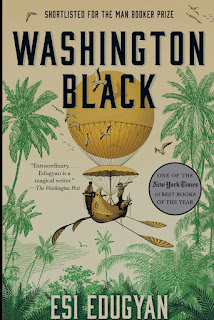Washington Black : A Novel by Esi Edugyan. 2018
Washington Black won the Giller Prize in November 2018 and was shortlisted for the Booker Prize.
The story opens in 1830 on a sugar plantation in the Barbados. The narrator is a 12 year old slave born on the island, George Washington Black, he goes by “Wash”. The plantation is owned by a very cruel master. Sugar plantations were among the worst places for slaves. The master was quick to give very harsh punishments, including executing those caught running away, to serve as an example.
Everything changes when the master’s younger brother arrives from London. He is working on a ballon and he asks for the loan of Wash, as he is the perfect weight for ballast. The brother is Christopher “Titch” Wilde. He is the first white person to see Wash as more than just a slave.
The plot covers six years in the life of Wash. Almost every chapter either gives us a startling new revelation or leaves us on edge.
Titch and Wash develop a relationship, it seems slightly paternal but it is very subtle. Titch begins to teach Wash to read. Wash starts making very accurate drawings of his surroundings.
I do not want to give away the very exciting plot. It does take us from the Barbados, to Washington DC with an anti-slavery activist, to the Arctic living in an Igloo, to Nova Scotia then London.
Edugyan vividly evokes each location. Minor characters are well realized. Everyone is described so we can visualize them.
Her prose is exquisite. I greatly enjoyed George Washington Black.
ESI EDUGYAN is author of the novels The Second Life of Samuel Tyne and Half-Blood Blues, which won the Scotiabank Giller Prize, was a finalist for the Man Booker Prize, the Governor General's Literary Award, the Rogers Writers' Trust Fiction Prize, and the Orange Prize. She lives in Victoria, British Columbia.. from Amazon.com
I have added her other two novels to my Amazon Wish List.





3 comments:
Mel, this new-to-me book sounds very interesting.
I loved this one too. And Half-Blood Blues is also very good (you might even enjoy the wartime setting in Europe more).
One thing that I thought was interesting about readers talking about this story was how often someone would say after reading it "well, that's outrageous, that thing she has happen" (I won't name the spoilers, but I'm sure you'll think of one obvious scene) but, at the same time, it's not often said how outrageous the very idea of enslaving people is, how clear it is in the story that nobody in it *should* be enslaved but many are.
Good posst
Post a Comment